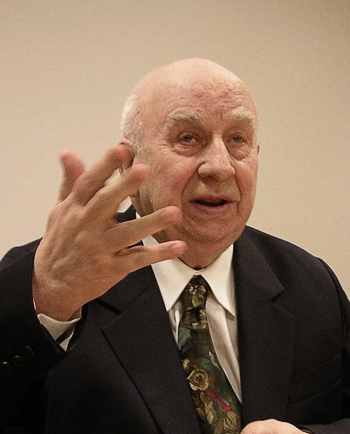
Mieczysław Gogacz – a Polish philosopher and theologian, a Thomist, the founder of consequent Thomism. He was born on 17 November 1926 in Nadróż near Rypino. He attended school in Obory, living near the Carmelite monastery and the Sanctuary of St. Mary, which influenced his spirituality and intellectual development. He could no longer go to school when the war broke out. During the German occupation the inhabitants of his homeland, i.e. the Dobrzyn Land, which was annexed by the Reich, were treated in a particularly brutal manner. After the war he continued his education in the Rypin junior high school, and then at the bishop’s secondary school in Płock where he obtained his secondary school certificate as an extramural student. The same year he took up his philosophical studies at the Catholic University of Lublin (KUL). In 1952 he obtained the master’s degree based on his master’s thesis entitled “Definicja ruchu u Arystotelesa” [Aristotle’s Definition of Motion] written under the supervision of Stanisław Adamczyk. Two years later he became a doctor of philosophy on the basis of the doctoral thesis “Filozofia bytu w ‘Beniamin maior’ Ryszarda ze Świętego Wiktora” [Philosophy of Being in “Beniamin maior” of Richard of St. Victor] (Stefan Swieżawski was the thesis supervisor). After that he started teaching at KUL. In 1956–1957 he was offered a one-year scholarship of the French government which made it possible for him to study at the Sorbonne and carry out his research in Biblioteque Nationale in Paris. From France he went to Canada where he continued his specialist studies supervised by Étienne Gilson at the Pontifical Institute of Mediaeval Studies in Toronto. In 1960 the Philosophical Faculty of KUL carried out the postdoctoral examination for M. Gogacz based on the dissertations published under the common title “Problem istnienia Boga u Anzelma z Canterbury i problem prawdy u Henryka z Gandawy” [The Issue of the Existence of God According to Anselm of Canterbury and the Issue of Truth According to Henry of Ghent]. On 13 April 1962 the Council of the Faculty of Philosophy decided to confer Gogacz the degree of the docent. In 1966, after being invited by the university president Józef Iwanicki, he started working at the Faculty of Christian Philosophy of the Academy of Catholic Theology in Warsaw (ATK). At ATK he obtained the following scientific degrees: in 1973 – associate professor, and in 1982 – full professor. He managed the Department of the History of Philosophy, analysing medieval philosophy, especially the heritage of Thomas Aquinas. He taught the history of philosophy, Thomism and philosophical anthropology. In the 90’s of the 20th century, due to the political changes in Poland, he started giving lectures, mainly on the realistic philosophy and ethics, at the University of Warsaw, the Medical University of Warsaw and the Military University of Technology.
As a philosopher and philosophy historian, Mieczysław Gogacz cleaned Thomism from the elements of the Arab philosophy. Also, he created a kind of existential Thomism called the consequent Thomism. Within that realistic philosophy of being, he fiercely defended the theory of the act of creation and the principle of non-contradiction, the thesis concerning the separateness and internal unity of particular beings, and realism resulting from such theories. In his work he paid special attention to the issue of existence (“Elementarz metafizyki” [The Basics of Metaphysics], 1987). In philosophical anthropology he used and developed the problem of transcendentals (“Człowiek i jego relacje” [The Man and His Relations], 1985). In ethics he emphasized the existential personal relations different from the essential relations of cognition and action (“Ku etyce chronienia osób” [Towards the Ethics of Protecting Persons], 1991). Moreover, in ethics M. Gogacz defined the standard of morality as wisdom understood as the attribute of intellect and the expression of the man’s rational nature (“Wprowadzenie do etyki chronienia osób” [Introduction to the Ethics of Protecting Persons], 1998). With regard to pedagogy, he suggested separate standards for the selection of activities facilitating human influence and protecting people against the results of falseness and evil in culture (“Osoba zadaniem pedagogiki” [A Person as the Task of Pedagogy], 2000). He dealt with culture for all the time of his research and writing activity (“Szkice o kulturze” [Sketches on Culture], 1985). His research on mysticism was often reflected in the publications concerning the Catholic religious life (“Filozoficzne aspekty mistyki” [Philosophical Aspects of Mysticism], 1985; “Modlitwa i mistyka” [Prayer and Mysticism], 1987). Altogether, M. Gogacz published 37 books and almost 1000 articles (scientific and popular ones, reviews, interviews).
